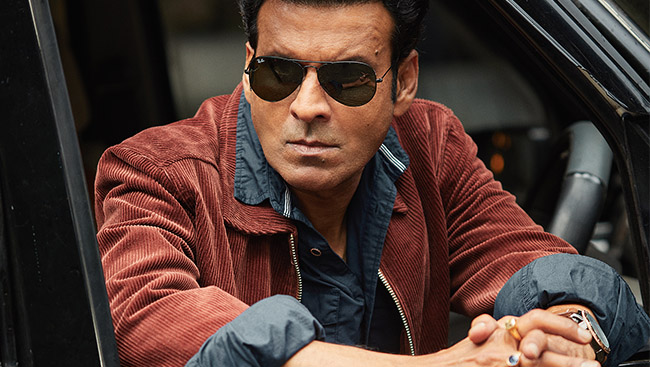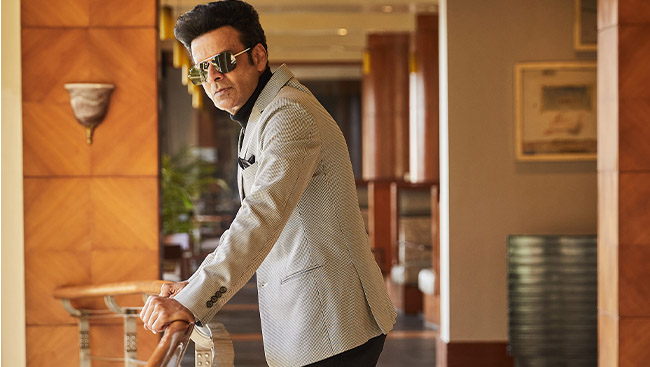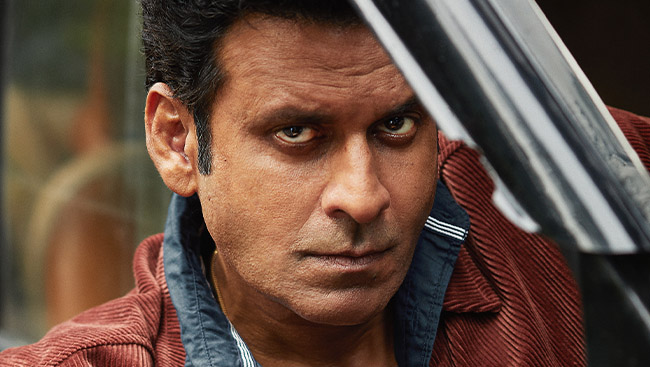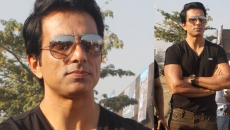In an exclusive interview with Darpan, versatile actor Manoj Bajpayee talks about his recent projects, the love he received for The Family Man, being extremely selective about doing web series in future and the film that changed the course of his career – Satya.
When it comes to mediums of entertainment, this incredibly talented man has done it all. Be it theatre, television, cinema or the new-age OTT — Manoj Bajpayee has left an impression on all platforms with his phenomenal performances. Over his two-decade-long career, he has done over 70 movies. He has played the hero; he has played the bad guy, he has also led an OTT drama through two successful seasons and has played a variety of roles that speaks volumes of his versatility. From dacoit Maann Singh (Bandit Queen) and Bhiku Mhatre (Satya) to Sameer (Kaun) and Rashid (Pinjar) to Sardar Khan (Gangs Of Wasseypur) and Ramchandra Siras (Aligarh) to Maan Singh (Sonchiriya) and Shrikant Tiwari (The Family Man), Manoj Bajpayee has captivated the audiences by investing himself fully into one compelling performance after another.
And yet, the man is completely unaffected by neither success nor failure and believes in giving his best always. Here Bajpayee shoots the breeze about The Family Man, the arrival of the OTT platform, being an artist, his landmark film Satya and how he doesn’t like the term ‘Bollywood’.
Excerpts from the interview…
Recently, one saw you in a variety of interesting roles on several OTT platforms — Right from reprising your role of the intelligence officer Shrikant Tiwari in season 2 of The Family Man to playing a kleptomaniac in the anthology Ray to playing an inspector in Dial 100 — as usual, your performance was impressive in all. However, while as an audience it is easy for us to switch channels and watch you in different avatars, as an actor what is your experience like jumping from one character to another?
It's not that I do all of it together. For me, it is always about focussing on one work and taking it to the finish line with a lot of preparation, a lot of concentration and the willingness to surrender to the role as per the director’s requirement, before moving to the next project. So, I don’t find being completely conflicted by all the characters.
“Actors are very different kinds of creatures” — Manoj Bajpayee

Actors sometimes speak about how tough it is to leave certain roles behind after they’ve played them, has it ever happened to you?
It used to happen. It happened till my film Shool (1999), but then I had to take it easy because it started taking its toll on me. My mental condition used to be really all screwed up after my films used to be over, and that trauma that agony that I used to go through was too much. I realized it was not at all worth it. So, I had to change my modus operandi, my method. But now it is far easier for me to leave my work behind and my character behind once the film is all wrapped up.
Well, speaking about being able to leave your character behind once you wrap up, what about one of your recent characters — Shrikant Tiwari from The Family Man series — it is one character that you have lived with for a couple of years now. What according to you has changed most significantly in him through the course of the two seasons? And how did you incorporate that aspect into your performance?
Shrikant Tiwari that you have seen in the first season, is remarkably different from the one in the second season. While he was all confident, sure of himself — conflicted yes between his family and job responsibility — and had a sense of humour in the first season, all these characteristics of his completely lacked in the second season. In the second season, he is trying to find his own ground, he is somebody who is not happy with the job that he is doing, he is having trouble with the family that he is sacrificing everything for. Basically, he is not happy with any situation in his life. So, when he goes to Chennai also, he doesn’t get in that kind of mental space to be really there but he is trying, he is trying very hard to fulfil his duty. So, these are the two different aspects of Shrikant that you get to see in both the seasons and they are completely different from each other. This is how human beings are — few years are all great and you are sure of yourself and suddenly a few years come where you start questioning your own ability, you start questioning everything you are surrounded with — that is how Shrikant Tiwari’s character is shaped.
Did you ever anticipate that Shrikant Tiwari’s character would create such a strong widespread appreciation while filming it?
See, you work very hard for the project and your character, you don’t ever work on it thinking it will not work. You have all the intention of making the character alive, and you hope that people are going to enjoy and relate to the character that you are playing. But The Family Man getting such global appreciation is something that I had never thought of when I was preparing for the role, or when we were shooting the first season or the second season. The fan base has increased, it is humungous. So, you feel good that people are seeing the work that you have been doing for so many years, appreciating you and encouraging you. It is quite overwhelming that way.

What is your checklist before signing a movie or web series?
I have decided that I am not going to be part of those many web series. I am part of The Family Man and till all its seasons are completed and the show finally closes down, I am going to be a part of it. Besides that, I have one more limited series, but I will talk about that in detail when the right time comes as there is an embargo and I can’t talk about it. So, yes, I am not going to do more than a selected few web series. I am going to be quite choosy when it comes to web series, and how many I should do, and how many I shouldn’t. So, at this point, The Family Man is something that I am very proud of to be associated with and whenever the third seasons’ date will be required, I can give it to them. Instead of overworking, I am taking it easy — Spending time with my family, travelling and in between I shoot for a few films.
It is always about being happy in whatever situation you are in. I am happy that people are offering me a lot of work but I can’t afford to be stressed when I am working. So, it is always better to do limited work, enjoy working on those characters and give your best. So, the series is something I have decided I won’t be a part of more than two series at one time. And as far as films are concerned, it is always the same — the first and foremost is the script, the world should be new, the character should be something that I have never done before, and the director has to be an exciting talent who is going to take out the best from of me. So, these are the things I look at when signing a film.
What stories interest you the most — the ones with larger-than-life characters or the ones which have a strong social message or the ones that display a realistic portrayal of the society?

I am not judgemental about what interests me. What truly interests me is a good script. It doesn’t matter what genre it belongs to — it can be large-than-life, it can be a very real character, it can have a social message, or even if doesn’t have a social message — what matters is that it is a great well-written story, and the overall project is fantastic, then I will go ahead and do it. Everything depends on the script, otherwise, I am really not judgemental about it.
You are one of those few actors who have been part of all the mediums of entertainment — theatre, cinema and now OTT, do you look at all these mediums differently? Is your approach towards each medium as an actor different?
Every medium has its own challenges and an actor has to understand those challenges, those requirements, that discipline and accordingly have to get into it. Theatre I believe is an actor’s medium and an actor is challenged much more in theatre than in OTT or cinema. OTT if you are doing series — it is a lot of work, a LOT OF WORK. Keeping the consistency in your craft, being well-versed with the whole script — it is all are very very difficult when you are doing a web series. In all of this, now I have realized that cinema is something in which you finish your part in 40 days and you are out, but with series, it is just ongoing, the work doesn’t stop at all. Today, if I am part of The Family Man, I have to know the character till they culminate the show completely. So, getting the nuances of that character again in all the seasons is an added responsibility. With cinema the writing is very different, it is a 2-2 ½ hour film. When one is doing a film, one has to look at all the demands that come with that medium. One needs to understand the space, understand the camera, understand the light, understand the editing, or sound — you have to have the understanding of everything. That understanding actually helps you in OTT also, but OTT throws a lot of burden on you. There is a lot of responsibility on you to really keep the consistency going for 8 episodes or 9 episodes or 10 episodes.
“Being an artist liberates me completely!!!” — Manoj Bajpayee
Speaking of OTT, many see the onset of OTT platforms as a game-changer for the film industry, what are your thoughts on it?
I don’t know if it is a game-changer or not, only time will tell you the impact of OTT on the film industry or cinema in our country. But one thing is for sure, OTT has given the audience a lot of choices to go and explore the medium. And when the pandemic is over, hopefully very soon, people will already be used to the world of stories in their living rooms. And when they will go to theatres now their expectations will be different and why not. Moreover, if the expectations of the audience are different it puts a lot of responsibility on filmmakers, actors and all the talents who are making cinema. We will have to meet those expectations and incorporate new things that the audience will be expecting from us.
Talk about meeting expectations — As an actor, you have always met all your audience expectations, be it while playing a protagonist or antagonists, however, as an artist what do you prefer the most — playing the good guy or the bad?
Protagonist or antagonist — I can’t say I prefer this or that, I am an actor. I am primarily an actor and if the role is well-written then whether it is either protagonist or antagonist, I will put in all I have to bring that character to life. I have to put in all my experience, my understanding of my craft and try to fulfil the requirement of the director and be part of his vision, understand his vision. So, I don’t categorize any characters I play, but yes, all of them should be well-written otherwise there is no point in doing any role. If the part offered to you is really exciting, one should go ahead and put the best foot forward and give everything to it. Play it well.
Undeniably, every character you have played has made an impression on the audience. However, do intense roles affect your natural state of mind?
Intense roles always affect you very badly. They have the ability to make you suffer but actors are very different kinds of creatures, they love that suffering, they just love it. And when they are in that zone it is always better to leave them alone. I like to be left alone when I am playing those kinds of characters but they affect me only for that period. Once I am into something else, I forget what has happened. But somewhere I feel that all of these roles that one plays, they all leave some bruises somewhere, that is why actors are quiet people. Mostly they keep it to themselves and they don’t open up so easily.
You hail from Belwa in Bihar, how would you define your journey from there to Bollywood?
I hate the term Bollywood, and I don’t know why anybody calls it Bollywood. We have been making original stories for a long time now, we don’t even copy west as much as we used to, still, I don’t get why we have to call it Bollywood. Anyway, to sum up, my journey, I would say – it has never been consistent, it has been quite a roller-coaster ride.
During this roller-coaster ride, you have won several awards, including the prestigious National Award and a Padma Shri, which you rightly deserve. However, how do you deal with the weight of your achievements? Does it pressurize you or does it motivate you to keep doing better?
It gives me happiness — all the national and international awards that I have won and achieved have brought immense joy. When I was honoured with a Padma Shri, I saw that smile and pride in my family’s eyes and it gave me a lot of happiness. So, the awards and recognitions don’t pressurize me, also I believe awards don’t decide anything at the end of the day. The motivation always comes from the love for acting, the love for my craft. I always want to explore new roles, be part of great scripts, work with great directors, and this is what motivates me, this is what excites me. I am never weighed down by my achievements or the acclaim or the appreciation. I do what I want to do. I always do what excites me to get out of the house that is very important for me.
So, which are the exciting new projects that are driving you to work lately?
I am not allowed to talk about them. But all I can say is that I am part of Raam Reddy’s next film, Kanu Behl’s film (Dispatch), Abhishek Chaubey’s project, then I am committed to a new director — Rahul who has been an assistant to Mira Nair. I will begin shooting that film once I am through with Abhishek’s project, then I am also a part of one more new director’s project. So, I have many projects that are lined up, but yes, I am doing one film at a time. I am not somebody who can handle two films, three films at the same time.
What about the third season of The Family Man, how soon can we expect it?

Hopefully soon. Season 3 of The Family Man is still not written, once they start writing it, then they will take my dates. Right now the directors and I are quite busy.
Is there anything in your artistic life that you regret?
One doesn’t regret anything. I am somebody who doesn’t get affected by success or failure, so if I am not affected by these two aspects of life, I can do whatever I want to do. I go where I want to go, behave however I want to behave. But at the same time, if I am sensitive about myself, I ought to be sensitive about others too, so I actually don’t have any regrets. Being an artist actually liberates me completely, it gives me a sense of freedom. It doesn’t bind me and it doesn’t stop me from doing anything.
In your two-decade-long career, you have done over 70 films, which movie according to you has changed your life the most and how?
Which movie has changed my life? Well, I would say Satya. It definitely changed my life. It changed the whole course of my life. I was nothing, I was doing small roles in television series or films, with no hope of getting any breakthrough and suddenly Bhiku Mhatre happened and the world came to know about me and my ability as an actor. That film has given me a career, it has given me everything that I have today. So, it is all thanks to Satya.
Talking about Satya, what was the thought behind the million-dollar laughter in the film that still echoes?
I don’t know, I just wanted to throw that laughter. I just wanted to convey to the audience that he is a child, he is vulnerable, he is on a high right now as an independent person, as an independent mafia guy, who worked with bhau for so long. He was on a high, and that aspect got elevated by that laughter. And I am so happy that people still remember that. It’s been so long that anyone asked me about it. So, thanks a lot.
On the memory of that iconic laughter, which marked the arrival of the brilliance called Manoj Bajpayee in Hindi cinema, we sum up the interview.






